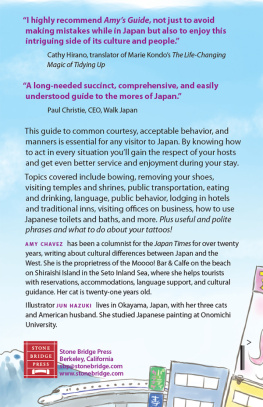P. O. Box 8208, Berkeley, CA 94707
Text 2018 Amy Chavez.
Cover and interior artwork by Jun Hazuki.
Design and layout by Linda Ronan.
2nd printing, 2020.
All rights reserved.
No part of this book may be reproduced in any form without permission from the publisher.
Printed in the United States of America.
Introduction
Hospitality and Thoughtfulness in Japan
Visitors to Japan often comment on how polite the Japanese people are. Many consider Japan to be one of the most polite countries in the world.
And they are probably right. The Japanese call their unique style of polite behavior toward travelers omotenashi. Usually translated simply as Japanese hospitality, omotenashi is actually far more complex, and an exact definition has yet to be agreed upon.
But not to worry, youll have a good idea of what omotenashi is after reading this book!
The Japanese are, for the most part, elegant and sophisticated people who perform even the smallest task with great pomp and circumstancefurther accompanied by a bow and a smile.
This does not mean that as a visitor you have to mimic the Japanese or try to be as polite as they are. It does mean, however, that Japanese are sensitive to less than gracious behavior. Knowing some amount of Japanese protocol will make your visit to Japan go much more smoothly for both you and your hosts.
Included in this little book are many of the things I wish someone had told me before I came to Japan twenty-five years ago. It is natural to take years, even a lifetime, to get to know a culture, but it is also natural to want to avoid making embarrassing mistakes. So in a society where it is deemed impolite to point out someones shortcomings, youre likely to feel some frustration when trying to learn what is acceptable behavior in Japan and what isnt.
The aim of this book is to reduce the number of times you exclaim, If Id only known! after making the same mistake over and over without realizing it. I wrote this book because sometimes we really do need to be told what and what not to do.
That said, please consider the points in this book to be guidelines rather than rules. The highly regimented style of Japanese behavior offers little room for unacceptable actions or varying opinions (dont blow your nose in public, for example, as everyone will think its rude), yet there are plenty of vague areas, with exceptions sometimes made for children, students, the elderly, and others depending on the situationincluding tourists and foreigners like you!
You will no doubt find some people lacking proper manners in Japan just as you will in any society. They are the exceptions, and the occasional rogue shouldnt reflect on Japanese behavior as a whole, or be justification for your own rudeness.
Youll also find some things considered unacceptable in your own country (slurping while eating noodles, perhaps) to be perfectly acceptable, or even encouraged in Japan.
Note that some customs may change depending on the area or your relationship to the Japanese person youre interacting with. A homestay family will comport themselves differently toward a non-Japanese who is welcomed into their home as a family member as opposed to a one-time visitor. Or Japanese who have lived abroad may dispense with many of their own customs while in your presence. One thing many Japanese people will automatically do in the presence of foreigners, for example, is pour their own drinks. While this would be impolite when among other Japanese (protocol says you should wait for someone else to fill your glass), many Japanese realize this is not a custom in other countries, so when drinking with foreigners they will gladly fill their own glass. Should you know enough about Japanese customs to offer to fill their glass, however, they will be delighted. Also, Japanese will often introduce themselves by their first names (I am Yuji.), because they know thats what foreigners do, even though they will use only their last name when introducing themselves to another Japanese (I am Tanaka).
Some customs may seem rude to you, even when they are attempts by the Japanese to be kind. I spoke with a Polish man and his son who were offended by the behavior of a Japanese innkeeper. The innkeeper didnt have enough space to store their luggage while they went out sightseeing for the day, so he offered them 600 to use at a coin locker at the train station, which was right next door. When the two men turned down the money and walked away with their bags, the innkeeper, thinking they had misunderstood, followed them out onto the street and insisted they take the coins. But the travelers interpreted this differently. How embarrassing to have this man chase after us down the street as if we were criminals! We didnt want his moneywe wanted better service!
Indeed, one of the most difficult things to decipher about Japanese culture is not the rules per se but what is going on in the backgroundthe impetus for the rules. Everyone knows they should be on time for a meeting, for example, but in Japan, being late is more than just a small inconvenience to those waiting for you. Meetings cannot start until everyone is present; drinking cannot proceed until a group toast is performed. If you tell people you are leaving on the train at 10:00 a.m., and change the time to 11:00 a.m., you may have, unbeknownst to you, inconvenienced an entire army of people who had planned to see you off at the station. Japanese people are constantly arranging things in the background: tickets may have been bought, performances arranged, food prepared, or gifts acquired, all without you realizing it. This is all done with a desire to please the guest in Japan.
When it comes to everyday activities, one concept central to Japanese etiquette is everything in its proper place. You will find few people jogging on the city streets, for example, as sports activities are normally done in the public park. You wont find Japanese people putting objects in their mouth that werent made for it: pencils, fingers, a postcard while digging into their bag to find something. They dont sit on anything that isnt designed for sitting on (fences, posts, or even stair steps). Occasionally youll see rebel high school kids sitting on steps and eating, but they are rebel high school students; youre not. And everyone thinks those kids are being rude. As you read this book, it may at times seem like your mother is standing over you scolding you to be polite, but as it turns out, your mother was right. She probably knew you would go to Japan some day.















